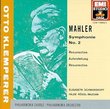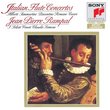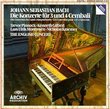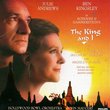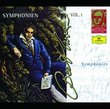Brahms revisited
Thomas van Grafhorst | The Netherlands | 01/02/2000
(5 out of 5 stars)
"Not often ochestrations are better than the original. Often, the Brahms Quarted is not played well, most of the time simply because the piano is too loud. Schoenberg repainted the piece in a magnificent way. In this version the lines are more clear then the Brahms version: it's therefore pure fun to listen to, especially if you know the original version. Schoenbergs arrangement of Bach's pieces sounds even more monumental than the original organ works, but the sound and clean recording plays a role in it. The recording is fantastic, full of rich details."
Great performances for uneven pieces, but well worth hearing
N. Daniele Pietro | Milano, MI Italy | 03/03/2000
(4 out of 5 stars)
"This CD represented kind of a surprise for me: from the famed (or infamous ) inventor of the twelve-tone music one could expect spare, minimalist orchestrations ( like Webern's transcription of Bach' s Ricercar), instead here Schonberg uses with no inhibitions a dense , luxuriant orchestra, decidedly Strauss-sounding to my ears. This approach has mixed results. The Brahms is the best thing here : after all Brahms' scoring was tendentially weighty, so this version works very well, and what you get is almost another Brahms symphony. Only the last movement is a bit overdone , decidedly more Strauss than Brahms, but, as a whole; I liked it a lot. I have reservations, instead, about the three Bach arrangements, and especially about the most substantial piece, the Prelude and Fugue St.Anne. If, obviously, Schonberg's mastery in using instrumental colors is never in doubt (many effects are really striking) but I think that the majesty and the "absoluteness" so inherent in Bach's music require more tightness, less flourishings. May sound strange, but the Stokowski Transcriptions, so often (wrongly) accused of being "Bach in Hollywood" , were much more effective in that respect, achieving at one time all the drama one could want, with no loss of clarity. The fugues, especially, by their very nature must sound inexorable and here , if the Prelude works well, the Fugue just does not flow like it should: I got distrcted by too many changes of instrumental groups. To hear the difference just listen to the Passacaglia and Fugue orchestrated by Stokowski on Decca Phase 4 or on Chandos (Bamert conducting). I don't want to seem harsh, though: with this CD you get 40 min. of great listening ( the Brahms) and 30 of very intriguing one, because for all the flaws, the Bach pieces (the two Chorales are appropriately hushed) have their moments. The Houston Orchestra under Eschenbach sound really great, with impeccable playing and a very brilliant ,yet refined sound. First-class engineering."
A Painting from a Drawing
Jrkaar@aol.com | 01/28/2000
(5 out of 5 stars)
"I agree with Mr. van Grafhorst -- and disagree with Mr.Hurwitz. This is no "moustache on a Mona Lisa." It is more like a full-scale painting tane from a charming sketch. It's also like discovering a new Brahms symphony. All the essential lines of the original piece have been tastefully elaborated and enriched."
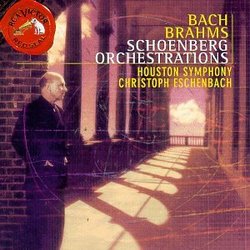

 Track Listings (7) - Disc #1
Track Listings (7) - Disc #1